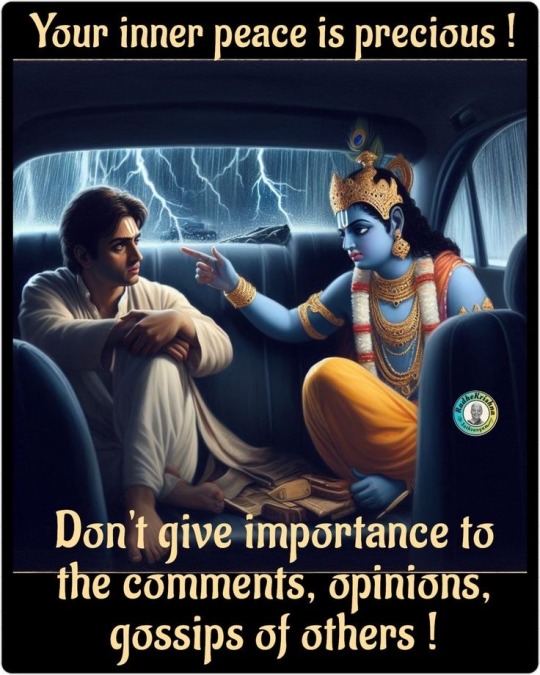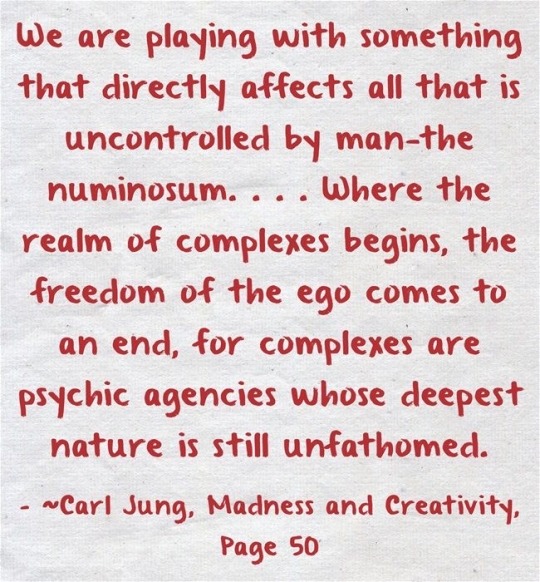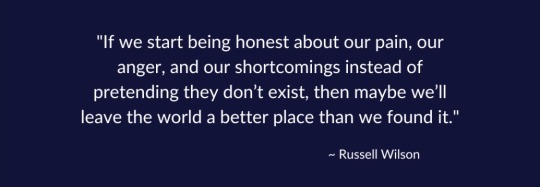Text
It bothers me how many people are morally incurious, and it bothers me even more how many people seem to think that interrogating morality is proof of immorality- because I'm pretty sure that the latter is at least partly driving the former. Asking why an action or institution is wrong does not necessarily mean that someone thinks that that action or institution is right. If you never ask yourself why something is wrong or right, then what is determining your morality? Because it's not you.
8K notes
·
View notes
Text
Staying in the Flow of transitions
We think that if we just meditated enough or jogged enough or ate perfect food, everything would be perfect. But from the point of view of someone who is awake, that’s death. Seeking security or perfection, rejoicing in feeling confirmed and whole, self-contained and comfortable, is some kind of death. It doesn’t have any fresh air. There’s no room for something to come in and interrupt all that. We are killing the moment by controlling our experience. Doing this is setting ourselves up for failure, because sooner or later, we’re going to have an experience we can’t control: our house is going to burn down, someone we love is going to die, we’re going to find out we have cancer, a brick is going to fall out of the sky and hit us on the head, somebody’s going to spill tomato juice all over our white suit, or we’re going to arrive at our favorite restaurant and discover that no one ordered produce and seven hundred people are coming for lunch.
The trick is to keep exploring and not bail out, even when we find out that something is not what we thought. That’s what we’re going to discover again and again and again. Nothing is what we thought.
Things are always in transition, if we could only realize it. Nothing ever sums itself up in the way that we like to dream about. The off-center, in-between state is an ideal situation, a situation in which we don’t get caught and we can open our hearts and minds beyond limit. It’s a very tender, nonaggressive, open-ended state of affairs. To stay with that shakiness—to stay with a broken heart, with a rumbling stomach, with the feeling of hopelessness and wanting to get revenge—that is the path of true awakening. Sticking with that uncertainty, getting the knack of relaxing in the midst of chaos, learning not to panic—this is the spiritual path.
Things falling apart is a kind of testing and also a kind of healing. We think that the point is to pass the test or to overcome the problem, but the truth is that things don’t really get solved. They come together and they fall apart. Then they come together again and fall apart again. It’s just like that. The healing comes from letting there be room for all of this to happen: room for grief, for relief, for misery, for joy.
– Pema Chodron
16 notes
·
View notes
Text
"Our job is to love others without stopping to inquire whether or not they are worthy."
- Thomas Merton
35 notes
·
View notes
Text
Idk for some reason, people really have it in this mindset that they're healed, more authentic, and better than chronic complainers because they're always talking about how they're "unbothered" by everything, don't complain about anything, do not have an issue with literally anybody (except negative people, apparently), don't want to be around people who have issues with other people, just want to go to work and go to bed
But really they're describing depression, repression, apathy, low emotional intelligence, escapism, and/or projection
Like NOTHING bothers you except people that are bothered by things, to the point of shitting on them? Low emotional intelligence and/or apathy and/or projection.
You literally do not care how bad or good someone is because it's just not your place to give a fuck and you see everything related to morals as just unnecessary gossip? Apathy
You just don't want to deal with people ever unless they can be as shallow minded and toxic positive as you and can avoid any difficult conversations that require an understanding of struggling and trauma because it's not "live laugh love"? Low emotional intelligence, apathy, and escapism.
You just literally cannot "sit and stew" in the negativity but you can sit for days, weeks, months, etc on other people being negative because it's for some reason on your mind despite "not being bothered"? Repression and projection.
You literally don't want to acknowledge any problems of the world and just get that bag and go home and vibe? Probably depression, some repression, and more than likely escapism.
It is NOT healthy to be this apathetic toward negativity. And it's also probably the most privileged you can be, is uninterested and uncaring about the world's problems, your friend's problems, evil people, etc, but you can certainly make time to complain about the people who complain about it.
*and if you were authentic, you wouldn't need to push your performance so hard and push everyone else down in the process for living differently than you, unless they're negative to everyone because they're being a dick, like you're being one, then it's not your business*.
40 notes
·
View notes
Text

39 notes
·
View notes
Text
“AFTER YOU DIE
Just so you know
after you die
I will not wonder
why you didn’t do
your dishes or
how long it’s been
since you
cleaned your
oven or microwave or
mopped your floors
or why there were
dust bunnies under
the bed and
behind the door
After you’re gone
I will not wonder
how you could
have allowed the
piles of old mail to
accumulate or
why you saved so
many bits and pieces
of this and that or
why you weren’t
more goal-oriented and
well-organized or
why your refrigerator
contained so many
expired condiments
When you are
absent from all your
familiar places
I vow to avoid wondering
why you didn’t
eat less and
exercise more or
why you waited so
long to stop smoking
or drinking or
whatever else was
simultaneously
soothing and
deadly or
why you took
whatever risk may
seem to have hastened
your exit or why
you left so much unsaid
unfinished or
unresolved
I will only wonder
if you knew how much
you mattered to me
just as you are
as you were when we
met in our temporary
human disguises and
laughed in the
dressing room of the
world at how funkily
our skin suits fit
at times
I will wonder and
hope you knew
you were beloved
I will wonder when
we last hugged
and whether you
felt how our
heartbeats
converged
and our bellies
bumped like boats
and then we
both sighed
~ Marva Lee Weigelt

19 notes
·
View notes
Text
"My heart is moved by all I cannot save: so much has been destroyed. I have to cast my lot with those who age after age, perversely, with no extraordinary power, reconstitute the world."
Adrienne Rich
6 notes
·
View notes
Text
Here are 7 Lessons from the book Radical Acceptance by Tara Brach:
1. Accepting Reality, Not Resignation: Radical Acceptance isn't passive resignation. It's acknowledging reality, with all its joys and sorrows, without judgment. This allows you to respond consciously instead of reacting impulsively.
2. Befriending Your Emotions: We often try to push away negative emotions like sadness or anger. Brach teaches us to befriend these emotions, allowing them to be present without judgment. This creates space for understanding and processing them.
3. The Power of Mindfulness: Mindfulness is the foundation of Radical Acceptance. By paying attention to the present moment without judgment, we become aware of our thoughts, feelings, and bodily sensations. This fosters self-compassion and clarity.
4. The Cycle of Suffering: Brach explains how resistance to what is creates the cycle of suffering. By accepting reality, we break free from this cycle and experience greater inner peace.
5. Decentering from the Self: Our sense of self is often based on our thoughts and emotions, which can be fleeting and unreliable. By decentering, we step back and observe these experiences without getting attached to them.
6. Radical Compassion: Compassion isn't just for others; it's essential for ourselves too. Radical Acceptance encourages extending kindness and understanding towards yourself, even when you struggle.
7. Finding Refuge: Life can be overwhelming. Brach emphasizes finding refuge, which can be a supportive community, spiritual practice, or connection with nature. Having a source of solace helps navigate difficult times.
***
14 notes
·
View notes
Text
Eihei Dogen, the founder of Soto Zen in thirteenth-century Japan, said that being enlightened means realizing that 80 percent of the time you’re deluded.
— Walking the Way by Robert Meikyo Rosenbaum
12 notes
·
View notes
Text
By simply letting yourself be, as you are, you develop genuine sympathy toward yourself.
— Shambhala: The Sacred Path of the Warrior by Chögyam Trungpa
149 notes
·
View notes
Text
You've got to figure out how to be happy yourself before you can really help other people be happy. (…) When you're not happy you're obsessed with only one person's plight — your own.
— Lama Marut, A Spiritual Renegade's Guide to the Good Life
6 notes
·
View notes
Text
I have no right to call myself one who knows. I was one who seeks, and I still am, but I no longer seek in the stars or in books; I’m beginning to hear the teachings of my blood pulsing within me. My story isn’t pleasant, it’s not sweet and harmonious like the invented stories; it tastes of folly and bewilderment, of madness and dream, like the life of all people who no longer want to lie to themselves.
~ Hermann Hesse
60 notes
·
View notes




